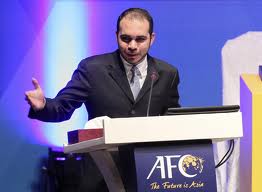By Andrew Warshaw, chief correspondent
October 10 – Asia’s FIFA vice-president Prince Ali Bin Al-Hussein has questioned the decision to strip Iraq of host status for the next Gulf Cup, intensifying Asian football’s latest controversy especially over the issue of what does and doesn’t constitute political interference in sport. The competition, due to be held late next year or early in 2015, features the six member states of the Gulf Cooperation Council (GCC), plus usually Iraq and Yemen. Crucially, it is not recognised by FIFA but is passionately contested among those involved.
Iraq announced this week it is boycotting the next edition in protest at a decision to move the tournament from the southern city of Basra to Jeddah in Saudi Arabia. Iraq had been due to host this year’s tournament as well, but this too was moved – to Bahrain, which is the home country of Asian Football Confederation President Shaikh Salman bin Ebrahim Al Khalifa.
Iraq’s Ministry of Youth and Sport said it was “extremely disappointed” at the latest switch, denouncing the move as politically motivated. That drew an immediate response from the AFC which warned the Iraqi government to stay out of football.
It is understood, however, that the GCC – which compromises Bahrain, Kuwait, Oman, Qatar, Saudi Arabia, and the United Arab Emirates and which took the decision to strip Iraq of host status – is made up primarily of government officials. This could itself be interpreted as constituting political interference and therefore laying the AFC open to accusations of double-standards.
“It’s a valid point,” Prince Ali told InsideWorldFootball. “No decision should be made for political reasons alone. It’s a bit sad that this is not taking place in Iraq.”
Prince Ali has already questioned FIFA’s ban on Iraq hosting friendlies, imposed because of security concerns, and believes it is unfair to exclude them while other countries facing similar problems were allowed to play at home.
He told InsideWorldFootball: “Teams don’t have to go there for friendlies, it’s a matter of choice. FIFA were concerned about the (safety of) match officials and I understand that but there are lot of countries who are members of FIFA going through similar problems. Why is this exclusive to Iraq?”
Turning to the Qatar 2022 World Cup, Prince Ali said he expected a decision on the timing of the tournament by the end of 2014 rather than the following year but questioned the original decision to hold the ballots for 2018 and 2022 at the same time three years ago.
“I’m still asking myself why there was a double bid,” he said. “I’ve heard various reasons and none of them were satisfactory. I still think Qatar would have won if the two votes had been separate. They may have even been better prepared vis-a-vis the timing. We wouldn’t be in the situation we are now. “
Contact the writer of this story at moc.l1745291097labto1745291097ofdlr1745291097owedi1745291097sni@w1745291097ahsra1745291097w.wer1745291097dna1745291097


